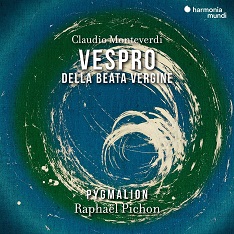« Grösser als wir…“, so wird im absolut lesenswerten Booklet Monteverdis Marienvesper beschrieben. Das ist ein Anspruch, den das Ensemble Pygmalion für sich einfordert – und auch einlöst. Diese Marienvesper klingt zunächst einmal wunderbar erfrischend, spritzig, vital, rhythmisch und musikalisch ungemein farben- und abwechslungsreich.
Man spürt in jeder Phrase die Theatralik, das Bühnenhafte, das der große Opernkomponist Monteverdi auch in diese Komposition einbringt. Das Ensemble Pygmalion setzt beim Zuhörer zunächst das Kopfkino in Bewegung, lässt durch den stellenweise opulenten Klang das Bild eines prachtvollen höfischen Festes entstehen, wie es sie zu Monteverdis Zeiten häufig am Hof von Mantua gegeben hat.
Lässt man sich von dieser Lebenslust, dieser Vitalität mitreißen, führt das Ensemble Pygmalion den Zuhörer wie selbstverständlich tiefer, sogar viel tiefer in die Musik hinein, auf die spirituelle Ebene. Dirigent Raphael Pichon nennt es, das Streben nach Wahrheit. Er sucht und findet sie in dieser bemerkenswerten Kombination von fast tänzerischer Leichtigkeit und geistiger Vertiefung, ein Wechselspiel, das die Interpretation wie ein roter Faden durchzieht und diese Marienvesper so nachhaltig macht. Mit der Conclusio und dem letzten Amen ist die Musik wohl zu Ende, das Erlebnis, das Wirken dieser Marienvesper allerdings noch lange nicht. Sie begleitet den Zuhörer unbewusst noch einige Zeit, bevor er seine ganz persönliche Conclusio findet.
« Greater than we… » is how Monteverdi’s Marian Vespers is described in the booklet, which is absolutely worth reading. This is a claim that the ensemble Pygmalion claims for itself – and also fulfills.
First of all, this Marian Vespers sounds wonderfully refreshing, lively, vital, rhythmically and musically immensely colorful and varied.
One senses in every phrase the theatricality, the stage-like quality that the great opera composer Monteverdi also brings to this composition. The Pygmalion ensemble initially sets the listener’s mental cinema in motion, letting the occasionally opulent sound create the image of a splendid courtly feast, such as often took place at the court of Mantua in Monteverdi’s time.
If one allows oneself to be carried away by this joie de vivre, this vitality, the Ensemble Pygmalion leads the listener as a matter of course deeper, even much deeper into the music, onto the spiritual level. Conductor Raphael Pichon calls it, the pursuit of truth. He seeks and finds it in this remarkable combination of almost dance-like lightness and spiritual deepening, an interplay that runs through the interpretation like a thread and makes this Marian Vespers so enduring. With the Conclusio and the last Amen, the music is probably over, but the experience, the effect of this Marian Vespers is far from over. It accompanies the listener unconsciously for some time before he finds his own personal Conclusio.




















